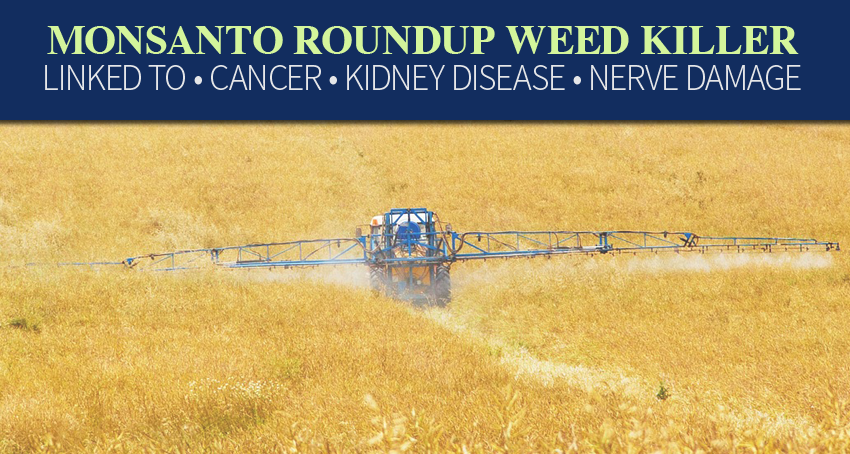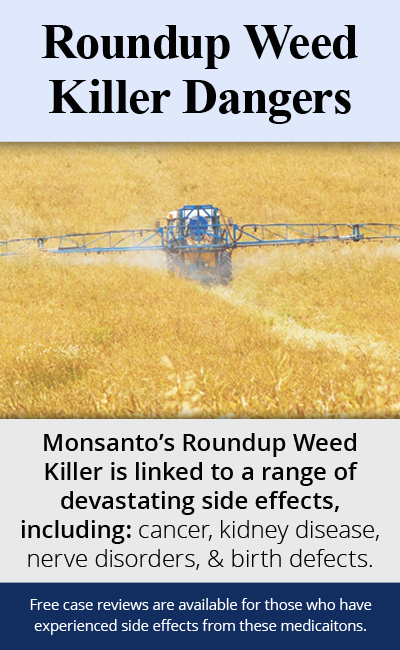¿QUÉ ES herbicida Roundup?
Roundup es un herbicida fabricado por Monsanto que contiene glifosato, que está diseñado para inhibir una enzima llamada EPSP sintasa, algo que las plantas necesitan para crecer. Sin EPSP sintasa, las plantas son capaces de producir otras proteínas esenciales para el crecimiento, y que finalmente se marchitan y mueren, en el transcurso de días o semanas. Roundup se pulveriza sobre el césped y cultivos para el control de muchas variedades de plantas exóticas invasoras, y el uso del herbicida se ha incrementado dramáticamente en los últimos años, debido en gran parte a la introducción de “Roundup Ready” cultivos de Monsanto, que están modificados genéticamente (OMG) a ser resistentes a glifosato.
¿POR QUE HAY UNA DEMANDA REDONDEAR.MAS?
A pesar de que Monsanto ha comercializado Roundup como un producto seguro, “biodegradable” y “medio ambiente”, numerosos estudios publicados en los últimos 20 años han demostrado que el herbicida en realidad puede estar ligada a un aumento del riesgo de cáncer y otros problemas médicos. Como resultado, los consumidores que han sido diagnosticados con enfermedades graves como el linfoma no Hodgkin después de haber sido expuestos al Roundup están llevando a cabo las demandas de responsabilidad por productos contra Monsanto, alegando que la compañía no proporcionó advertencias adecuadas sobre los posibles riesgos para la salud de Roundup, e intencionalmente datos falsos sobre la seguridad del herbicida
EFECTOS secundarios relacionados al Roundup herbicida Roundup está clasificada como la segunda césped y jardín herbicida más utilizado en los Estados Unidos, y se comercializa como fácil de usar y eficaz contra las malas hierbas invasoras, como los dientes de león, la hiedra venenosa y kudzu. De acuerdo con un creciente cuerpo de investigación, sin embargo, las personas que trabajan o viven cerca de granjas donde se utiliza el Roundup puede estar en riesgo de consecuencias graves para la salud, incluyendo:
- Linfoma no Hodgkin
- Enfermedad de Parkinson
- Cáncer de pulmón
- Cáncer de cerebro
- Cáncer de tiroides
- Enfermedad del riñón
- Daño en el nervio
- Leucemia
- Enfermedad del corazón
- Esclerosis múltiple
- Enfermedad respiratoria
- Defectos de nacimiento
- Esterilidad
ESTUDIOS ROUNDUP que alegan Efectos secundarios En 1985, el New York Times publicó un informe citando a un comité de la Agencia de Protección Ambiental (EPA), que encontró que la exposición al Roundup herbicida puede causar cáncer, pero seis años más tarde, la EPA invierte sus conclusiones después de reevaluar el estudio que su conclusión original estaba basado en. Ahora la cuestión de la seguridad de Roundup está de vuelta en los titulares, y en marzo de 2015, la revista The Lancet Oncology publicó un informe de la Agencia Internacional para la Investigación sobre el Cáncer (IARC), que indica que el glifosato contenida en el Roundup es un “probable carcinógeno humano. “las investigaciones realizadas en el Paraguay también mostró que los bebés nacidos de madres que viven cerca de campos fumigados con glifosato tenían más del doble el riesgo de sufrir defectos de nacimiento.
RECIENTES resumen de noticias Un poco más de un año después de la IARC, que es el brazo de investigación del cáncer de la Organización Mundial de la Salud (OMS), informó que el glifosato era posiblemente carcinógeno para los seres humanos, un juez de California rechazó una solicitud de Monsanto para desestimar una denuncia presentada por un hombre que afirmó que desarrolló el linfoma no Hodgkin, como resultado de estar expuesto a Roundup. Mientras tanto, el glifosato ha sido prohibido en Sri Lanka, debido a su presunto vínculo con la enfermedad renal, Brasil está considerando hacer lo mismo, México y los Países Bajos han impuesto nuevas restricciones al herbicida, y Canadá ha comenzado el proceso de considerar nueva Roundup reglamentos.
¿CÓMO unirse a la demanda REDONDEAR.MAS?
Si usted ha estado expuesto al Roundup, ya sea mientras se trabaja en o que viven cerca de una granja en la que se utiliza el herbicida potencialmente peligroso, y que ya ha sido diagnosticado con linfoma no Hodgkin, enfermedad renal, enfermedad del corazón u otra enfermedad grave, consultar el conocedor abogados de responsabilidad de productos en Monroe Law Group hoy para discutir cómo puede unirse a los litigios Roundup. Los abogados de Monroe Law Group tienen años de experiencia ayudando a los individuos persiguen una compensación económica por las lesiones y costosas facturas médicas asociadas con productos de consumo peligrosos, y que sólo se les paga si usted gana su caso.
No hay riesgo de que en consultar uno de nuestros abogados hoy. Póngase en contacto con Monroe Law Group ahora por teléfono al 866-308-1092 o por correo electrónico a intake@monroelawgroup.com para organizar para su libre, sin obligación de consulta.


